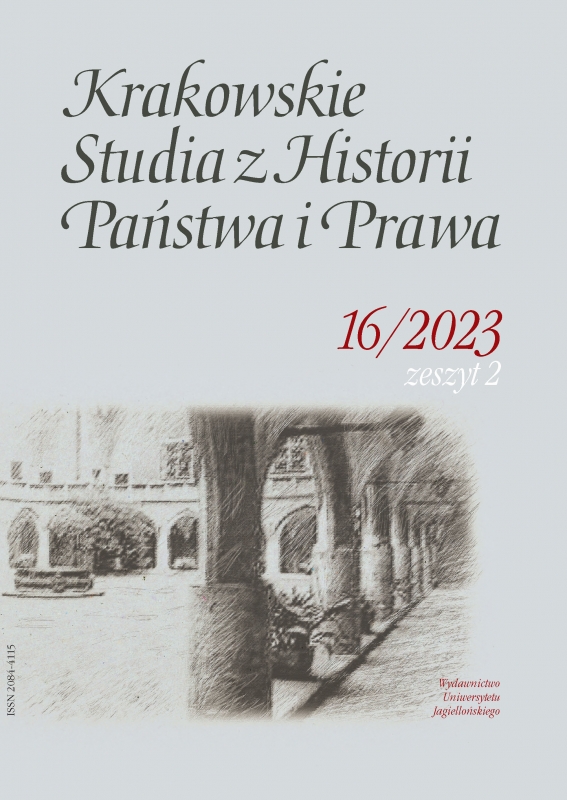Realizacja postanowień Konstytucji Rzeczypospolitej Polskiej z dnia 17 marca 1921 roku w zakresie wymiaru sprawiedliwości
Implementation of the Provisions of the Constitution of the Republic of Poland of 17 March 1921 Concerning the Administration of Justice
Author(s): Robert JastrzębskiSubject(s): History, Law, Constitution, Jurisprudence, Recent History (1900 till today), Interwar Period (1920 - 1939), Administrative Law
Published by: Wydawnictwo Uniwersytetu Jagiellońskiego
Keywords: Constitution of the Republic of Poland of 17th March 1921; administration of justice; judicature; citizens’ participation in the administration of justice; ordinances of the President of the Republic
Summary/Abstract: The article – divided into four sections – is centered around the implementation of the provisions of the Constitution of the Republic of Poland of 17 March 1921 in the area of the administration of justice. The first section discusses the work on a draft constitution carried out between 1917 and 1921, with particular focus on the judiciary. The second analyses the content of the provisions of the Constitution referring to the administration of justice. The third deals with the judicature. In this section, the author discusses the organisation and work of, among others: the State Tribunal, the Supreme Administrative Tribunal, the Competence Tribunal, and courts of common pleas, paying particular attention to the unimplemented norms of the Constitution – mainly the failure to establish administrative courts of different instances with the participation of citizens, and the absence of citizens serving as justices of the peace or jurors. Two issues played important roles in the implementation of constitutional norms regarding the administration of justice. The first was the political situation in Poland after the 1926 May Coup. The second was the amendments to the Constitution introduced in connection with the entry into force of the 1926 “August Amendment”, that gave the President of the Republic of Poland the power to promulgate ordinances having the legal effect of legislative acts. This allowed the Polish government of that time to carry out, to a great extent, a standardisation of the courts of common pleas, which was accomplished by promulgation of the Ordinance of the President of the Republic of Poland of 6 February 1928 – the Act on the Organisation of Courts of Common Pleas. Additionally, between 1929 and 1932 the government embarked on an extensive program of dismissing existing judges and appointing new ones. Importantly, this was accompanied by a change in the line of jurisprudence of the Supreme Court and the Supreme Administrative Tribunal, according to which courts lost their authority to examine the constitutionality of ordinances promulgated by the President of the Republic of Poland. In the final section of the article – the summary – the author notes that the implementation of the norms of the Constitution concerning the administration of justice was, to a great extent, non-existent, given the political situation after the May Coup. It further points out that the same was also true in the period between 1944 and 1952, during which the basic principles of the Constitution of 17 March 1921 applied.
Journal: Krakowskie Studia z Historii Państwa i Prawa
- Issue Year: 16/2023
- Issue No: 2
- Page Range: 203-235
- Page Count: 33
- Language: Polish

